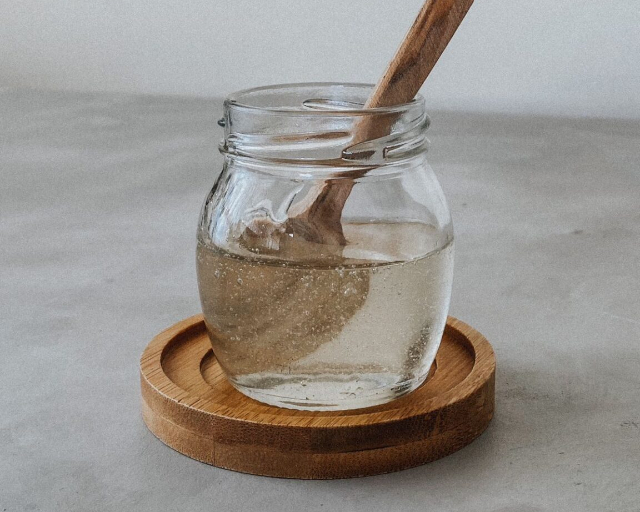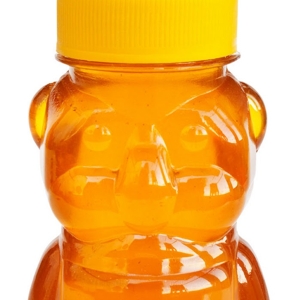A Netherlands company, called Fooditive, says it’s perfected ‘bee-free honey’. There are many significant nuances to this development. But the most important question it raises may be, is this new triumph of genetic engineering a miracle or a monstrosity?
 Bee-free Honey: In its ‘purest’ form, clear, colourless and flavour-neutral.
Bee-free Honey: In its ‘purest’ form, clear, colourless and flavour-neutral.
Let’s start with the overall concept, and the goal(s) behind it. The phrasing, ‘bee-free’, clearly indicates that the inventors intended to create a ‘honey’ that harmed no living creatures. Secondarily, the whole deal takes place ‘in vitro’, as it were. Apiarists are no longer required to raise and tend tens of thousands of potentially-dangerous insects. Nor are they any longer at the mercy of climate change. Extremes in temperature and moisture have always threatened nectar-blossom crop yields and endangered the bees themselves.
Whats big deal?
Fooditive founder and CEO Moayad Abushokhedim says, “Our goal is to provide the world’s first 100 percent bee-free honey with no compromise on taste, quality or price. The process of genetic sequence modification used in our honey already has an established track record with our vegan casein. We believe our process will be the stepping stone for a revolutionary advancement in the food and biotechnology industries, enabling any animal product to be mimicked and even improved by bioengineering plant-based ingredients.”
An abstract of its official announcement adds: “The development of Fooditive’s bee-free honey has been driven by concerns that common apicultural management practices in commercial beekeeping can be detrimental to the welfare of farmed honeybees and wild bee species.”
How they do it…
“Leveraging [a] patented biotech process, which was launched last year, honey DNA is copied into a proprietary strain of yeast,” Fooditive explains. “When fed with nutrients and precision-fermented to replicate the metabolic processes that occur in the honeybee stomach, this yields a product with the same characteristics and functionality of bee-produced honey – from taste, colour and viscosity to its health benefits.
“The production trials will recreate the lab-proven concept in 1,000-L fermenters, with samples to be made available for potential customers to try and test out in their own applications.”
Questions galore…
Regardless of the stated motivations behind developing bee-free honey, there are questions galore…
The honey crop is really just a byproduct of a billion-dollar per year industry that raises and trucks honey bees across North America to pollinate a whole range of crops humans and animals rely on for food. Can the bee-free honey movement and the natural honey industry find a way to peacefully co-exist?
The process involves a proprietary strain of yeast, into which honey DNA is copied. That’s just a fancy way of saying the bee-free honey is the product of a genetic modification procedure. How will Non-GMO activists feel about the new product
How will vegetarians and vegans feel about yeast? Is it a plant or an animal?
Will consumers flock to the new product for any particular reason? (I.e.- Are their any practical advantages to bee-free honey?)
Can the demand for bee-free honey ever grow large enough to support a self-sustaining industry?
A few answers…
First of all, yeast are microscopic animals, not plants – a misunderstanding many folks apparently labour under. So that may, indeed, cause concern among animal rights types and vegetarians. Though many vegetarians consider natural honey okay.
The process definitely involves genetic modification technology. I have a feeling there may be a big controversy within the Non-GMO community over bee-free honey. Only one GMO ingredient is involved. But that ingredient is not technically part of the final product; more like a reaction catalyst.
I see no real practical advantages to bee-free honey for consumers. But – as mentioned earlier – harvests of natural honey are becoming more unsustainable because of climate change, and bee-free could fill any gaps.
As for demand from commercial food processors… If the manufacturing process can be scaled up efficiently enough to offer significant cost savings, bee-free could become an attractive alternative for high-volume users who are seeking a sweetner with consistent colour, flavour, consistency, and moisture content.
My take
I think that the questions posed by bee-free honey – and inevitable debates that arise from them – may still be raging even after the process is perfected and Fooditive is ready to ship in volume. I hope they have some other projects (and new products) up therm sleeve to tie them over until that’s all resolved…
~ Maggie J.

